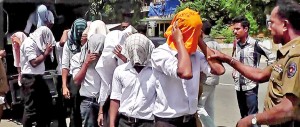Sunday Times 2
Launch an all-out effort to rid universities of ragging
View(s):By Dr Jeyaraman Devarajan
This week, I read some news about ragging in the Sri Lankan newspapers. At the beginning of every academic year, news surfaces about ragging. This is often unpleasant to read. It is important to understand that we need to eradicate this ugly activity in our higher educational institutions for good.
We live in a civilised world and should not tolerate this barbaric activity. The failure to do so poses a threat to higher educational systems. The university is a place to not only obtain a degree, but also refine our behavior and attitudes.
The word ‘ragging’ is mainly used in Bangladesh, India, Pakistan and Sri Lanka (Wikipedia). The concept of ragging does not exist in Western countries. According to Ayesha Wajahat (2014), ragging is known by different names in different parts of the world — hazing, fagging, bullying, pledging, and horse-playing.

Alleged Peradeniya University raggers being taken to courts
In the name of ragging, several students undergo mental and physical torture and sexual harassment; this is forced upon the victims without their consent. Ragging causes tremendous hardship and losses to undergraduates who are genuinely interested in studies and mental suffering to their parents. It also affects society and the country at large. Some students discontinue their studies, experience post-traumatic stress disorder (PTSD) and severe depression, lose track of their careers and do not get the opportunity to pursue higher education. In severe cases, ragging has taken the lives of students. Here are some distressing examples:
The first ragging related death occurred in 1975. A 22-year-old female student from the Faculty of Agriculture, University of Peradeniya, became paralysed after she jumped from the second floor of the hostel (Ramanathan Hall) to escape physical ragging from senior students. She later committed suicide.
In 1997, a 21-year-old engineering student died from a kidney failure suffered due to severe ragging by senior students. In the same year, another student from the Hardy Institute died from kidney failure, because he was forced to do tough exercise and drink excessive quantities of liquor.
In 2002, a third-year management student from the University of Sri Jayawardenepura was killed in a meeting while discussing anti-ragging campaigns. These are only a few reported cases. There are several unreported or less severe cases.
Ragging is a psychological problem. False values and attitudes influence ragging. In Sri Lanka, obtaining admission to a university is highly competitive, and students believe that it is a great privilege to obtain admission to universities. This type of attitude gives rise to a superiority complex in senior students. They tend to expect that junior students (‘freshers’) should respect them highly and follow orders blindly.
Someone can argue ragging helps junior students to know senior students, enable to develop a friendly environment, and overcome their shyness. According to Ayesha Wajahat , there is a common fallacy that ragging will create a friendly environment between seniors and juniors.
It is common for new students to experience a high level of stress when entering university, especially due to the change of environment. It takes a reasonable amount of time for new students to adjust to their new life. Senior students need to welcome the new students and provide moral support to them to cope with the challenges of university life. Rather than doing this, in the name of ragging, they increase their levels of stress and make their lives miserable for freshers.
Jealousy and an inferiority complex are also causes for ragging. Generally, students who come from affluent families and attended leading schools and girls seen as more attractive are subject to more severe ragging.
We all have a social responsibility to work together to eradicate ragging from our university culture. If we adopt a joint effort, this is not a difficult task. The academic community, student associations, the University Grants Commission and the media should work jointly to eliminate ragging in our universities. Here are some suggestions:
Treat ragging as a criminal offence and impose severe punishment such as suspension or expulsion from the university. For example, in 1974 it was reported that some trainee mathematics teachers at the Vidyalankara University (now known as University of Kelaniya) were ragged. Prime Minister Sirimavo Bandaranaike’s government appointed a commission (V.W. Kularatne Commission) to inquire into the incident. As a result, 12 undergraduates were expelled and four officials were penalised for their failure to take prompt action.
Counselling senior students to change their attitudes and behaviour towards ragging. The media, student associations, and the university administration should provide adequate information to senior students to make them understand the physical and emotional consequences of ragging.
Organise anti-ragging campaigns.
Discuss ragging, reporting procedures, and channels for seeking assistance during university orientation programmes.
Provide facilities to freshers to anonymously report ragging incidents.
Provide a helpline for students to seek advice, obtain information and report incidents.
Provide counselling to those who have been affected by ragging.
Student counsellors, student associations and senior students should form teams to monitor ragging and deny opportunities for senior students to perform ragging.
These efforts could help to eradicate ragging in our universities, and make them a safer place for promoting a high standard of education and cultivating good human values. The aim of universities is to produce not only talented scholars but model citizens.
(The writer was a senior lecturer at the Department of Management Studies, University of Jaffna.)

